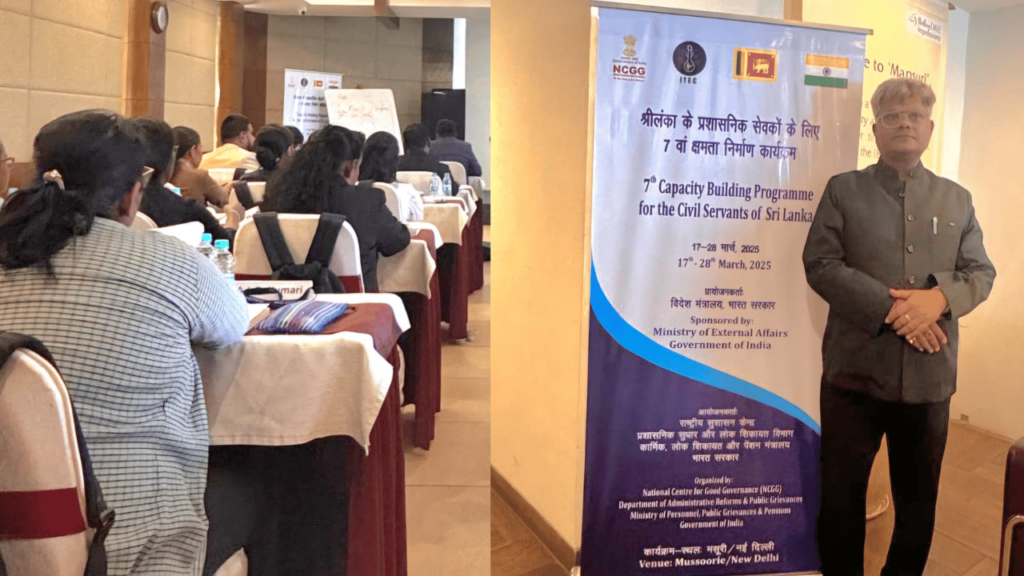Dehradun: In the picturesque hills of Mussoorie, where the air carries the quiet dignity of old traditions, something remarkable unfolded. Inside the historic walls of the National Good Governance Center, a group of 45 Sri Lankan administrative officers sat in rapt attention, not to learn theory, but to hear the living story of change. The speaker before them was no ordinary bureaucrat. He was a man whose innovative approach had turned the dusty, drought-ridden lands of Banda, Uttar Pradesh, into thriving, self-sustaining villages. Dr. Heera Lal, Chief Executive Officer (CEO) of Watershed Development Component Pradhan Mantri Krishi Sinchai Yojana 2.0, shared his experiences with Sri Lankan officers on innovative governance during a special training program.
This international training program, organized under the guidance of the Department of Administrative Reforms and Public Grievances, Government of India, was designed to foster global collaboration on good governance. It was more than a session on best practices; it was a bridge between two nations, built on the shared goal of solving rural challenges through governance innovations.
A Special Invitation Rooted in Impact
Dr. Lal was invited to this prestigious event by Dr. A.P. Singh, Associate Professor and Administrative Incharge of the National Good Governance Center, for one compelling reason: his groundbreaking work in Banda. His initiatives in water conservation, forest protection, and community engagement had not only transformed the district but also set a benchmark for others. His campaigns were not driven by top-down directives but by empowering ordinary citizens to become active stakeholders in their own progress.
As Dr. Lal took the podium, he reminded the Sri Lankan officers that governance is not about rules alone—it’s about relationships. “When the people start trusting the administration,” he said, “change becomes not just possible but inevitable.”
District-Level Innovation: A Blueprint for Change
During his presentation, Dr. Lal shared a detailed blueprint for solving district-level challenges. He emphasized that governance must be transparent, accountable, and participatory. He spoke about the power of small innovations—like rainwater harvesting and tree-planting drives—that led to big results in Banda.
His message was simple but profound: the problems we face today—whether in India or Sri Lanka—cannot be solved by doing things the old way. Climate change, corruption, unemployment, and poverty are complex challenges that require creative solutions. Dr. Lal’s approach, rooted in community participation and local ownership, demonstrated how even limited resources could be leveraged for maximum impact.
Real Stories of Change
What made Dr. Lal’s session truly powerful were the real-life examples he shared. He recounted how, as District Magistrate of Banda, he had launched a water conservation campaign that mobilized thousands of villagers to revive dried-up ponds and rivers. The result? Increased groundwater levels, improved agricultural productivity, and a renewed sense of hope.
He also spoke about his efforts to protect forests and wildlife, reduce school dropouts, and create income opportunities for women through self-help groups. These initiatives, he explained, were not imposed from above but developed in collaboration with local communities.

A Global Perspective on Local Challenges
Dr. Lal reminded the audience that the challenges faced by countries around the world are often similar, even if they look different on the surface. “Whether it’s a farmer in India struggling with drought or a fisherman in Sri Lanka worried about declining catches, the underlying issue is the same: how do we create sustainable livelihoods in a changing world?”
His answer was clear: innovation. By thinking outside the box, involving the community, and focusing on long-term solutions, it’s possible to overcome even the toughest challenges.
Dr. Lal’s insights left a deep impression on the Sri Lankan officers. Many of them praised his practical, hands-on approach and expressed a desire to implement similar initiatives in their own districts. “What I learned today is that governance is not just about enforcing laws—it’s about inspiring people to become part of the solution,” one officer remarked.
A Step Toward a Better Future
As the session came to a close, it was clear that this was not just a training program—it was a starting point for something bigger. By sharing his story, Dr. Heera Lal had planted a seed of change that could grow and flourish across borders.
In a world where governance often feels distant and impersonal, Dr. Lal’s message was a powerful reminder that real change happens when leaders step out of their offices and into the lives of the people they serve.


